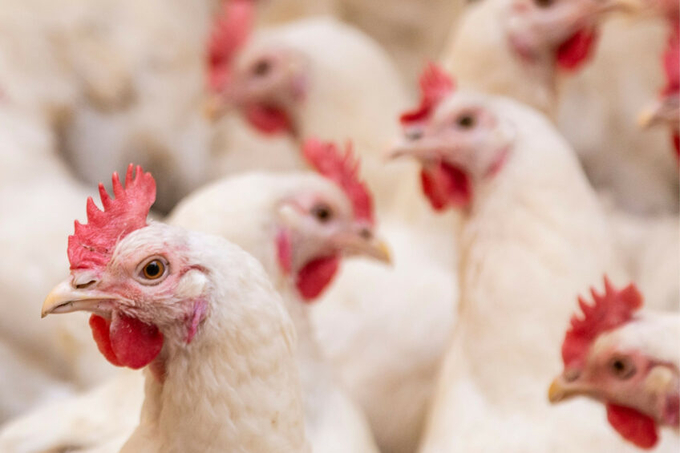June 15, 2025 | 10:57 GMT +7
June 15, 2025 | 10:57 GMT +7
Hotline: 0913.378.918
June 15, 2025 | 10:57 GMT +7
Hotline: 0913.378.918

A study has uncovered specific regions across 9 different areas of the chicken genome where genetic variations appeared to play a role in helping protect chickens from bird flu outbreaks. Photo: Canva.
The study, which was carried out by The Roslin Institute, University of Edinburgh, looked at chickens that survived a major outbreak of highly infectious avian influenza in 2015 and found genetic clues that could help protect chickens from deadly bird flu outbreaks.
Using blood samples, the team analysed the DNA from chickens that survived the viral outbreak and compared them with that of uninfected, presumed susceptible birds, seeking differences that could reveal genes linked to resistance. The birds studied survived a particularly lethal avian influenza outbreak, which saw a mortality rate of over 99%.
Genes and the immune system
The study showed uncovered specific regions across 9 different areas of the chicken genome where genetic variations appeared to play a role. Although no single gene fully explained why some chickens survived, the study pinpointed several genes likely associated with the immune system and the birds’ response to the virus. Regions associated with HPAI resistance were observed on chromosomes 1, 2, 5, 8, 10, 11, 15, 20 and 28, with a number of candidate genes identified.
Some of the genes identified in the birds, including one known as ANP 32A, are already known to play a role in how animals respond to bird flu. This suggests researchers are on the right track, as the presence of a gene with a known role in viral resistance support the idea that the other newly-identified genes may also be relevant to defence against bird flu.
Develop strategies
Dr Jacqueline Smith, senior research fellow at The Roslin Institute, said: “Chicken are extremely vulnerably to highly pathogenic strains of avian flu, so being able to examine DNA from a few birds that survived provided us with a unique opportunity to try and understand the genetics underlying resistance. This research gives us our first look at how the host response may enable birds to fight off infection – something we’re only beginning to understand now.”
With highly pathogenic avian influenza (HPAI) outbreaks becoming more common worldwide and infecting a wider host-range, further research could help scientists develop strategies to protect poultry and inform public health.
(PW)
![Turning wind and rain into action: [4] Bringing climate bulletins to remote and isolated areas](https://t.ex-cdn.com/nongnghiepmoitruong.vn/608w/files/linhnhp/2025/06/14/1152-z6704423696987_15fd32ffc26d590d204d520c9dac6786-nongnghiep-151141.jpg)
(VAN) The Vietnam Agriculture and Nature Newspaper interviewed Mr. Vu Thai Truong, Acting Head of Climate Change and Environment at UNDP Vietnam, to gain deeper insight into how climate bulletins are delivered to farmers.

(VAN) In Tien Giang, a high-tech shrimp farm has developed a distinctive energy-saving farming model that has yielded promising results.
![Turning wind and rain into action: [3] 300.000 farmers benefit from agro-climatic bulletins](https://t.ex-cdn.com/nongnghiepmoitruong.vn/608w/files/news/2025/06/12/e5a48259d6a262fc3bb3-nongnghiep-125122.jpg)
(VAN) The agro-climatic bulletin has become a valuable tool for farmers in the Mekong Delta. After more than five years of implementation, the initiative is gradually being expanded nationwide.
![Turning wind and rain into action: [2] Providing forecasts to the people](https://t.ex-cdn.com/nongnghiepmoitruong.vn/608w/files/news/2025/06/12/e5a48259d6a262fc3bb3-nongnghiep-103927.jpg)
(VAN) In addition to improving the quality of hydrometeorological forecasts, putting forecast bulletins into practical use is crucial for production and disaster prevention.

(VAN) Blue carbon is receiving attention for its rapid absorption capacity and vast potential. It represents a promising nature-based solution to respond to climate change.
/2025/06/11/3507-1-161904_583.jpg)
(VAN) Seagrass beds and coral reefs serve as 'cradles' that nurture life in the ocean depths, creating rich aquatic resources in Vietnamese waters.
![Turning wind and rain into action: [1] Forecasting for farmers](https://t.ex-cdn.com/nongnghiepmoitruong.vn/608w/files/news/2025/06/11/e5a48259d6a262fc3bb3-nongnghiep-111919.jpg)
(VAN) Weather is no longer just a matter of fate. Forecasts have now become an essential companion for farmers in every crop season.